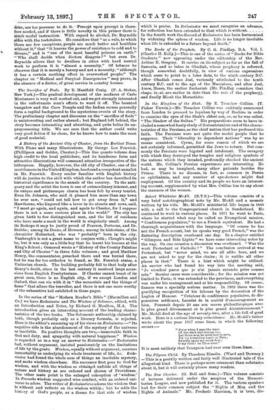A History of the Ancient City of Chester, from the
Earliest Times. With Plans and many Illustrations. By George Lee Fenwick. (Phillipson and Golder, Chester.)—This fine quarto volume does high credit to the local publishers, and its handsome farm and attractive illustrations will command attention irrespective of the letterpress. Happily, however, the old city of Chester, one of the most famous in the United Kingdom, has found a competent annalist in Mr. Fenwick. Every reader familiar with English history will do justice to the skill with which the author has described its historical significance in thearmals of the country. To the anti- quary and the artist the town is one of extraordinaryinterest, and its unique and picturesque charm has been felt by every tourist. Even Dr. Johnson, who said. it pleased him more than any town he ever saw, "could not tell how to get away from it," and Hawthorne, who lingered like a lover in its streets and rows, said, "I must go again, and again, and again to Chester, for I suppose there is not a more curious place in the world." The city has given birth to few distinguished men, and the list of residents who have made a mark in the world is singularly small Among its Bishops it may be justly proud of Pearson, Porteous, and Dr. Stubbs; among its Deans, of Howson; among its historians, of the chronicler Holinshed, who was "probably" born in the city. Vanbrugh's is not a great name to conjure with ; dough's might be, but it was only as a little boy that he learnt his lessons at the King's School ; Ormerod wrote a" History of the County Palatine and City of Chester" in three folio volumes ; and good Matthew Henry, the commentator, preached there and was buried there, bat he was far too orthodox to found, as Mr. Fenvrick states, a Unitarian church. The building probably fell to that body after Henry's death, since in the last century it received large acces- sions from English Presbyterians. If Chester cannot boast of its great men, there is no English city, if we except London and Oxford, that can vie with it in "the memorials and the things of fame" that allure the traveller, and there is not one more worthy of the exhaustive toil exhibited in these pages.
In the series of' the "Modern Reader's Bible" (Macmillan and Co.) we have Ecclesiastes and The Wisdom of Solomon, edited, with an Introduction and Notes, by Richard G. Moulton, MA. The introduction gives an interesting account of the leading charac- teristics of the two books. The Solomonk authorship claimed by both, though probably only as a literary formula, is rejected. Here is the editor's summing up of his views on Ecclesiastes :—" Its negative side is the abandonment of the mystery of the universe as insoluble. Its positive thoughts are two,—immovable faith in God and duty, and sympathy with natural happiness." Wisdom is regarded as in a way an answer to Ecclesiastes :—" Ecclesiastes had, without argument, insisted passionately on the limitations of life by -the grain. Wisdom, equally without argument, assumes immortality as underlying its whole treatment of life, &e. Beck,- 'tastes had found the whole sum of things an insoluble mystery, and seeks wisdom elsewhere. His successor first goes to God for wisdom, and with the wisdom so obtain&d, unfolds all things of nature and history as are ordered and chosen of Providence. The other main point is the enlarged conception of
In Proverbs wisdom suggested wise conduct, with in ordered uni- verse to adore. The writer of Ecelesiastious adores the wisclom•that Is withotit and 'reflects on the wisdom within; but he adds the history of Ood's people, as a theme for that aide of wisdom
which is praise: In Ecclesiastes we must recognise an advance, for reflection has been extended to that which is without In the fourth work the discord of Ecclesiastes has been harmonised by widening the sphere of wisdom. Life is no longer insoluble when life is extended to a future beyond death."


































 Previous page
Previous page